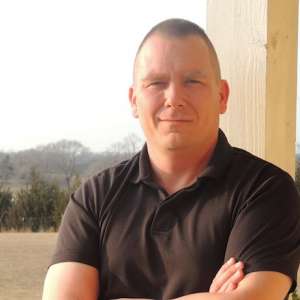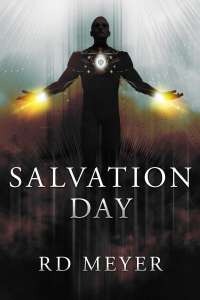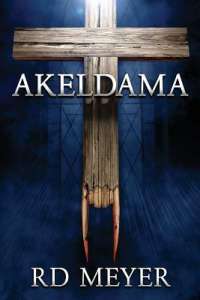
Tell us about your book.
Salvation Day is about one person’s journey through grief and questions about why life can sometimes be so cruel. The main character, Mike Faulkner, lost his baby girl to a childhood illness, and his wife, consumed by grief, committed suicide. Because she chose to kill herself, her soul was sent to Hell. Mike refuses to accept this, and he is in a unique position to do something about it. He’s a scientist who is working on a new form of energy that can affect the very bonds of reality, and he gets approached by a demon to use his discovery to wage war against God Himself.
Salvation Day is designed to get the reader to wonder about how each of us would react to being given the kind of power Mike has, and how far we would be willing to go in pursuit of vengeance.
Why did you choose to self-publish?
When I first began writing, I had the same fantasy that most writers have – to land a huge publishing contract and see my work on the shelves at Barnes & Noble. I even submitted my first novel, Akeldama, to a couple of agents. However, as I got more and more into writing and the writing community, I started doing research into traditional publishing.
Most of what I found was unsettling. I had no idea how narrow the traditional publishing world had become, nor how onerous their contracts were. Plus, the process of just getting published looked to be both elitist in nature and subservient due to the amount of control I would have to give up.
I know what I wanted to say, just like I knew things like how I wanted my covers to appear. After first dismissing self-publishing, I looked into it, and I was surprised by the way it has transformed over the years. There have been numerous self-published works that have been as successful as traditionally published books (The Martian, The Shack, Wool, etc), so a new path opened up.
 Would you self-publish again?
Would you self-publish again?
Absolutely! In fact, I plan to make self-publishing my main outlet for getting my work to the audience. I think most writers believe – before they’re published – that all they have to do is submit their work and the publishing company will handle all of that boring “business stuff.” That’s not true, especially for new authors.
I have a Masters Degree in Business, so I figured I should put that education to good use. That’s not to say I wouldn’t publish traditionally if an incredible opportunity came along, but I would be much more discerning if approached. In other words, someone is going to show me that moving away from self-publishing is going to be well worth my while just to get me to consider it, and it would be on a project by project basis. I think that self-publishing is the future of the business.
What do you think are the main pitfalls for indie writers?
Understanding the business aspects and preparing for startup costs. This is a business, and we have to think of it as a business. That means getting a federal EIN, business bank account, making contacts with bookstores, understanding book distributors like Amazon, and having a vision of what you want your work to look like. With traditional publishing, the publisher does things like editing and cover work. I guess some think that it’s fine to let them handle that, but you also give up a large amount of control.
Being a control freak myself, I want to be able to accept or reject edits as I see fit, as well as work with an artist on what my cover will look like. That can be very fulfilling, but indie writers have to know that it’s then on them to find an editor, a cover artist, someone who will convert your Word file to ebook and print formats, etc. It’s not terribly hard, but it does add a lot of responsibility on you rather than a publisher, so indie writers need to understand that before choosing to go that route.
What tips can you give other authors looking to self-publish?
1. Do your research. Know what self-publishing is and what it isn’t. Talk to folks who can turn you on to good editors and artists. You also need to know how Amazon, Smashwords, Apple ibooks, and Nook work.
2. Don’t be intimidated by people who say self-publishing is for losers who can’t land a deal, or by those who tell you your work stinks. The self-publishing world has changed in the last 15 years, and it’s ripe for success for those who seize the opportunity. Yes, it will take a break to find success, but that’s true in traditional publishing too. As to those who say your work stinks, there are lots of traditionally published books that stink too. I’ve seen some awful stuff come from traditional publishers. Put your work out there and let the audience decide.
3. Treat it like a business. Writing is the fun part, but fun doesn’t sell itself. Figure out how to market your work. Doing that can appear intimidating, but it’s really not once you get going. Besides, it’s not like traditional publishing has marketing and business figured out very well either.
Remember, these are the companies that also once rejected Harry Potter and Twilight.
As a writer, what is your schedule? How do you get the job done?
I have a pretty intense “regular job,” so I can’t yet live the dream we all have of waking up when the sun is warm and writing my next masterpiece. I’d love to sit down and write for eight hours a day, but it just isn’t feasible. So I set daily goals when I’m working on a novel. What I want is to write 1,000 words a day, which takes about half an hour. That means finding ten minutes here and there to write a little. I’ll do so either on a break or at night after my family is in bed. Basically, you have to get creative to find the time.
How do you deal with writer’s block?
In the same way I figure out what to write – by daydreaming. And honestly, that’s what finding a good story is. I have two main methods. The first is to walk my dog, which I do for 45 minutes or so, and just let my mind wander. The second is to sit in a chair while my daughter is watching cartoons and stare into space. When an idea seems interesting, I run with it. Writer’s block can sometimes be stubborn, but it can be daydreamed away. The key is to not force it and write just for the sake of writing. Let your imagination overcome it. It’s like playing out a movie in your head, only you get to choose the direction. Just let that happen.
Tell us about the genre you wrote in, and why you chose to write this sort of book.
I chose a paranormal/sci-fi setting not because I have some great affinity for the genre, but because that was the genre that best let me explore subjects of massive proportions. I’ve always enjoyed epic stories where the fate of the world was in the balance, as well as what implications our actins had beyond ourselves. It’s hard to squeeze a story about God and what happens to every soul in existence into a western.
Right now, I have only one novel that can’t be categorized as either paranormal or science fiction (my upcoming novel about a second American Civil War, entitled Schism), and even that’s about the fate of the nation. I want to be able to write about overarching topics that, if they happened, would have world-altering consequences. Paranormal/science-fiction best offers that.
What are your plans now your book is published?
To keep on writing and publishing. I have three more novels that are ready to go and which will be published over the next year or so. The first is a ghost story told from the point of view of the ghost. The second is a science fiction novel about humanity returning to Earth a few thousand years after being run off. And the third is about a new American Civil War based on today’s polarized political climate. I also have three novels that need to be rewritten, as well as new ideas that have to be put on paper. Balancing that is a challenge, but I can’t succeed if I don’t get my work in front of the audience.
Why did you write about this particular subject?
I think we all have questions about life. Sometimes it can seem unimaginably cruel. I see people go to one of two extremes when life gets them wondering about why things are the way they are – they either run away from faith completely, or they dig in hard because they think that even questioning God is a mortal sin. I think one can have questions about God, life, and existence without becoming militantly opposed to faith. My own questions began when my oldest daughter had some medical problems.
Thankfully, those are under control, but it got me thinking about why they happened in the first place. While walking my dog, I allowed my mind to wander down the path of what could’ve been, and Salvation Day is the result. Of course I couldn’t kill God or anything, and I’m about the farthest thing from a scientist that you can get, but it allowed me to sort through my issues and play around with a world unencumbered by the bounds of reality. I wondered what would become of me if anything happened to my family, and whether I’d succumb to grief or rage. Figuring that out was deeply emotional, but it also yielded a great idea for a novel.
Links
Author Site
Facebook
Amazon
Goodreads
Get an Editorial Review | Get Amazon Sales & Reviews | Get Edited | Get Beta Readers | Enter the SPR Book Awards | Other Marketing Services























Leave A Comment